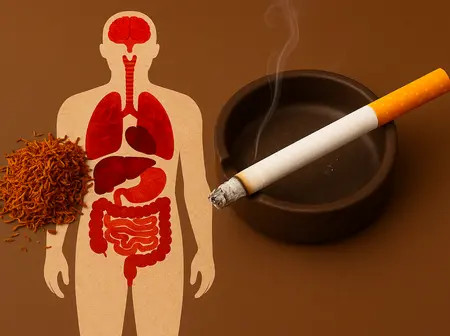Nairobi, Kenya: Every year, thousands of Kenyan families lose loved ones to tobacco related illnesses and the inability to afford medication.
For many, smoking begins during their childhood years, causing devastating health consequences, and enduring repeated failures before finally breaking free.
According to Tobacco Control Data Initiative (TCDI) 2022, 46% of Kenyan patients undergoing treatment for chronic respiratory disease, cardiovascular disease, diabetes, and cancers, had a history of tobacco use.
Approximately 8.5% of Kenyans aged 15 to 65 years use tobacco products, including smoking and smokeless forms, ranking men higher (14.7%) compared to women (0.7%) as per the Kenya Tobacco Control Data Portal of 2022.
The same source reports that 3.5% of adolescents aged 10–14 years also smoke. This shows that tobacco use starts at an early age, especially in primary schools.
To understand the broader challenge of tobacco addiction, we spoke with Stephen Biko, who began smoking in primary school. He and his friends used to pick up discarded cigarettes and hide to smoke them.
“I grew up in Majengo, and while I was in class 5, my friends and I would collect cigarette leftover ends and hide in the school toilets to smoke,” Stephen recalls.
What began as a playful childhood experiment later turned into addiction. Stephen smoked throughout his entire school years and into his marriage.
“I smoked until I completed form four and the addiction was so strong that I continued even after getting married. At night, I couldn’t sleep without smoking, and during the day, I could smoke around 20 cigarettes,” he says.
His health started to deteriorate. Stephen developed severe chest pains, but this only made him crave for more cigarettes.
“Smoking affected my breathing and my chest would ache. I started regretting my decision to smoke, but surprisingly, the pain made me want more cigarettes,” he adds.
His constant bad breath affected his wife, and their child as his wife pleaded with him to stop.
“Stress made things worse. My family was affected by my smoking. My child couldn’t bear seeing me addicted. She begged me to quit,” recalls Stephen.
All these made him reflect on his habits. Quitting wasn’t easy, but he eventually succeeded with gradual efforts.
“My child’s cry made me decide to quit, though it took three attempts. Quitting cigarettes requires a lot of effort. I’m grateful I finally succeeded. I no longer smoke, and now even the smell of cigarettes irritates me,” he says.
Stephen urges Kenyans, particularly the young people, to never think of smoking.
“I pity those still smoking because I have known firsthand the damage it causes. If you have never smoked, don’t be tempted to start, quitting is not an easy journey,” Stephen warns.
Like Stephen, Timothy Kamau’s addiction also began in school. His smoking became so severe that his father admitted him to a rehabilitation centre.
“I smoked tobacco for more than 20 years. My father was so worried that he took me to rehab, but it was not easy to quit. I relapsed several times,” Timothy narrates.
The effects on his health were serious. His voice was damaged, and his teeth deteriorated to the point that he now uses artificial teeth.
“Smoking tobacco makes you feel like you’re living in another world, but it destroys your health. My voice was affected and I lost my teeth,” he says.
Timothy is now grateful to God for helping him quit. He advises young people to stay away from tobacco entirely.
“To the young people who smoke, I urge you to stop because it takes a lot to quit,” he says.
Tobacco’s dangers go beyond smoking; even cultivating the plant poses health risks, especially to farmers and their families.
According to Dr. Catherine Karekezi, Executive Director at NCD Alliance Kenya, tobacco leaves contain harmful chemicals with more than 60 known to cause cancer. Farmers are also at the risk of these long-term conditions due to direct contact with the plant.
“It’s not just the cigarettes themselves, but even the tobacco plant. The dried leaves contain at least 250 harmful chemicals and the cultivation of tobacco exposes farmers and their families to hazardous chemicals, including those used during planting,” explains Dr. Karekezi.
She outlines the physiological impact of nicotine, the addictive component in tobacco which stimulates the nervous system and narrows blood vessels leading to serious cardiovascular problems.
Long-term exposure is also linked to type 2 diabetes, various cancers, and other non-communicable diseases (NCDs).
“Nicotine raises blood pressure and heart rate, and affects blood clotting which blocks blood flow, causing heart attacks, strokes, or amputations. It also contributes to different types of Non-Communicable Diseases,” Dr. Karekezi says.
She also notes the link between tobacco use and infectious diseases such as pneumonia and tuberculosis (TB), particularly in vulnerable populations.
“Smokers are more likely to contract TB and experience worse symptoms. It also increases vulnerability to pneumonia, especially in those with existing respiratory infections,” she explains.
Dr. Karekezi further highlights the connection between tobacco use and mental health issues. She warns that it worsens complications in some types of NCDs.
“Tobacco use can lead to depression, anxiety, and it also exacerbates complications of conditions like hypertension and sickle cell disease,” she says.
She further raises concern over nicotine products being marketed as less harmful alternatives, often in bright colors, with sweet flavors, and attractive packaging to lure young people and children, leading to potential long-term health consequences.
“We need to create awareness about the dangers of tobacco products, especially among the young people. The industry is promoting them as harmless fun, but youths are unknowingly exposing themselves to serious health risks,” Dr. Karekezi warns.
Stephen and Timothy represent the voices of many who were trapped by tobacco for years. Their stories show that while addiction is powerful, the will to break free is stronger. For the young people who have never smoked, their message is clear: don’t start because quitting is not an easy journey.

Leave a Reply